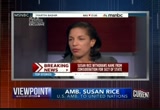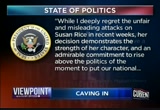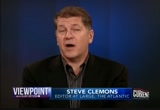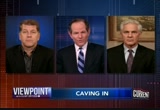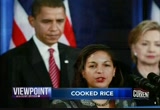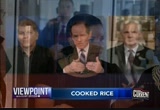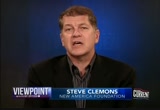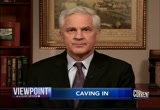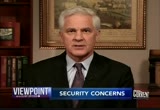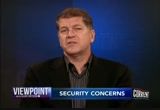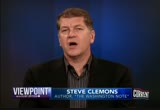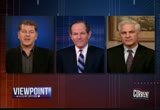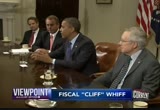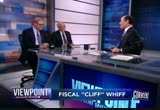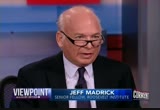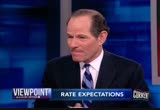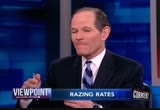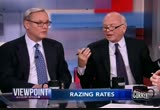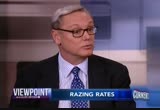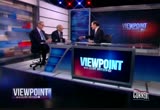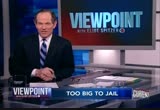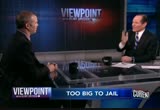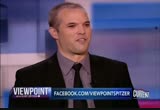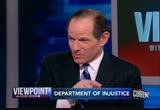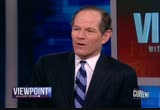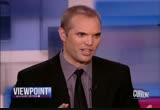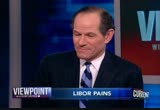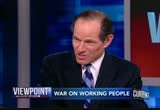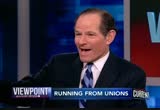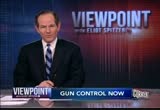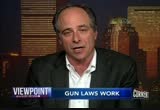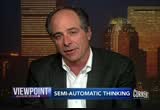tv Viewpoint With Eliot Spitzer Current December 14, 2012 2:00am-3:00am PST
2:00 am
with this nonsense about how he is bipartisan when of course he is massively republican in his policies. by the way, three or four senators came in and out during the speech. look at this again. this is the chamber as he's speaking. i think i can hear crickets. loser. loser. wow, what an esteemed senator. throw him in the ring. he had this coming for a long time. joe, watch out there you go. i didn't even want you t lieberman loser of the day. "young turks." we'll see you tomorrow. >> eliot: good evening, i'm eliot spitzer. this is "viewpoint." the president caved after months of republican attacks led by senators john mccain, lindsey graham and kelly ayotte on u.n. ambassador susan rice focusing
2:01 am
on her scripted television appearances following the benghazi tragedy today ambassador rice withdrew her name from consideration to be nominated for secretary of state. in an interview with brian williams, rice pointed to the distraction the republican attacks have caused. >> today i made the decision that it was the best thing for our country for the american people that i not continue to be considered by the president for nomination as secretary of state because i didn't want to see a confirmation process that was very prolonged very politicized, very distracting and very disruptive because there are so many things we need to get done, as a country. and the first several months of the second term president's agenda is really the opportunity to get the crucial things done. we're talking about comprehensive immigration reform balanced deficit reduction, job creation, that's what matters and to the extent
2:02 am
that my nomination could have delayed or distracted or deflected or made even some of the priorities impossible to achieve, i didn't want that and i would much prefer to continue doing what i'm doing which is a job that i love at the united nations. >> eliot: president obama released a statement expressing his dismay saying in part and i quote... >> eliot: joining me now is steve clemons editor at large of the atlantic and founder of the new america foundation program and joe cirincione, president of plowing shares fund and a member of hillary clinton's security advisory board. thank you both for joining us this evening. >> thanks for having us on. >> eliot: steve let me start
2:03 am
with you. after the way the president had reinforced susan rice, not only saying an attack on her is an attack on me at a press conference, the scripted applause and his statements about her at a cabinet meeting just recently, this seems like such a sharp u-turn and you heard me say a few moments ago seems as though the president caved. am i wrong about that? what do you understand to be going on here? >> well, i think it was. i think susan described it accurately. she's a very capable and competent woman who would have, i think done a great job as secretary of state. that said, it is a distraction. it has been a distraction. when jonathan karl asked the president what he thought of john mccain and lindsey graham's comments, i actually happened to be hosting the meeting that that happened at, it started a spark and you had a number of senators, john barossi was one susan collins who came out in expressing concern. two things were going on. ill feelings as a result of the
2:04 am
election. combined with ill feelings about things that susan rice may have said about john mccain in the past combined with benghazi. they felt they were able to make the president pay a price somewhat of a small price in their eyes but still a price and they were tenacious and the president -- i think you're right. i think he finally caved because this would be a painful thing to have benghazi play out day after day after day while he's trying to deal with fiscal cliff issues. >> eliot: steve, i think that's exactly right. those factors all converged. but joe it seems to me the president miscalculated here because they saw the factors were adding fuel to the flames and the senators who were arguing their case, the republican senators, believed very deeply they did not want susan rice but the president escalated the fight in the past number of weeks with his affirmative statements about susan rice, with the cabinet meeting so for them to have escalated this and then pull back at the height of his perceived capital just won that's what i don't understand
2:05 am
as a strategic matter. >> clearly, the president feels strongly about susan rice and is a believer in her capabilities and why not. she's a brilliant phi beta graduate. he's been with the obama team from the beginning. i was pleased to serve with susan rice on the national security team in the first obama campaign. she ran a terrific campaign effort there. she hasn't made any mistakes as u.n. ambassador. she has an outstanding record. the president believed in her. wanted to reward her. he thought he could beat mccain and graham, this travesty of an opposition. in the end it is clear, i don't think this is susan's decision alone. the calculation was this was going to be a costly victory. i believe that the president had pushed it in the end, he would have won but it would have been, as the ambassador described, a great distraction. there are other more important
2:06 am
issues to pursue. she goes out as a class act. >> eliot: i think there's no question, some of the critique of her which is that she's tenacious, another way of saying hard-edged sometimes she speaks her mind, another way of saying she can be edgy. they can be stated in different ways. she isn't perhaps the most smooth-edged person to deal with. steve, to come back to benghazi, the spark that lit the us for a. is there any evidence that you've seen that she did anything wrong anything other than read the script she was given in that context? in other words the facts do support her claim that hey guys, i was told what to say. >> not at all. i think it was completely fabricated attack on susan rice. when you think about it, look, i'm -- i try to be supportive of the obama administration when i can but i have to say that they're constantly behind when it comes to communications. because if you remember the iraq invasion and all of the lies and deceits about the wmd issues
2:07 am
that were there and what was said, it was flabbergasting to me that the white house didn't return the favor somewhat and put the onus back on the deceit and duplicity we've often heard in national security issues from the bush/cheney administration. they didn't do that. so they sat -- susan became a tremendous victim. you also had david petraeus who in my mind, was much more highly complicit in the decisions and in the actual on-the-ground realities of what the c.i.a. issues were there on the ground. and i think that that -- the white house let that play out and left susan out to hang. i think that's not often talked about. we don't talk about the difference between how the white house positioned her and used her but it was unfortunate because she had no blame whatsoever in this. >> let's be clear about that. she didn't do anything wrong. there is nothing here whatsoever that should disqualify her from being secretary of state. the president should be able to have the people he wants in his cabinet and he was denied that
2:08 am
here by a political campaign and it was clear that the senators were not going to let up. but i don't think we've heard the last of susan rice. she's meeting with the president tomorrow. >> eliot: that's right. >> this woman is too good to have her career stop here. i wouldn't be surprised if the president has something else in mind for her. and he's -- in some ways, he has to do this. he has to appoint her to another senior position. he can't appear to have caved or lost completely in this battle. >> eliot: that's my question, joe. does she stay at the u.n. perhaps or does she want to move on and who is the winner now? everybody's presuming and presumptions often are false that john kerry fills the void. is that a rash assumption on everybody's part? >> it is not a rash assumption. it was clearly a choice, those are the top two contenders. senator kerry is terrifically qualified for this position. the president in some way is in a fortuitous position. like dealing with a line-up for
2:09 am
the washington nationals. you've got a string of great players, just trying to figure out the right batting order. kerry could be secretary of state. hagel could become secretary of defense. you could see jack lew the current chief staff move over to the secretary of treasury. tom donelan move over to be chief of staff and then there's the natural opening for susan rice. she becomes national security advisor, close to the president. back in the washington mix and in a position to still help the president execute his policies. >> eliot: joe, i was with you on everything you said except the baseball metaphor. we in new york forget you have a baseball team in washington. a moment transitory time to have a team that can play above .500. did john mccain know about this before it was announced publicly? did white house call him and say okay john, you win this one but we want something back. we're going to give this to you. be gracious but here's what we expect in terms of a b or c?
2:10 am
what do you think? >> i have no idea but i doubt it. i think there was a lot of anger and frustration. i happened to be with senator mccain and john udall and barbara mikulski and john barrasso after they did their mugging of susan rice. john was -- knew he had hit at least a double if not a triple in going after her and basically put the white house back on its heels in the way the president responded to their comments. and i think that this -- you know, episode has given john mccain a win and i don't think the white house is going to say okay, we're going to give you what you want, now you have to play with us on other things. i don't think that's the way this game was played. this was a vicious game and i think there are resentments that will continue for some time. >> that's exactly right. although they plight be feeling like -- might be feeling like winners, i would not want to be senator mccain or senator graham. there is more to the story that won't go away. these people will pay for this in the long run.
2:11 am
>> eliot: we only have a few seconds left. to turn the tables on the susan rice story is it possible that what underlies this is the possibility that she knew something about the way her talking points had been edit and that's why she's taken her name out? any of you think that's possible? i just want to close the door on it. >> i don't believe it is an issue at all. i don't think that the factual nature of what she articulated with benghazi had anything to do with this. this was pure, rough and raw gladtorial politics that was divorced from reality. they took down someone. now the president is going to put forward hagel. they'll have hagel probably hagel, kerry, joe biden as vice president. barack obama as president. four great pals from the senate foreign relations committee. >> eliot: the senate is taking over the white house. they all want to live there anyway. they're getting in there through their subsidiary positions.
2:12 am
incredibly important positions. joe, last word to you. you agree there is no blemish on susan's record here in terms of what happened on those talking points. >> no blemish on susan's record. whether there was funny business with the talking points, we don't know. it is clear there is no benghazi story to continue here. we'll see this thing put to bed. we'll get on with the serious national security business of this country. >> eliot: as well we should. editor at large of the atlantic, steve clemons president of ploughshares fund, joe cirincione. seemingly they're right back where they started. what speakakakakakakakakakakakakakakakakakakakakakakakakakakakak nobody knows disasters like comedians. >> new york, the high-tech resilient city. just don't get us wet. what the hell was that? >> that's from my upcoming benefit for victims of hurricane sandy. i booked the strongest, smartest comics i could find. my comedian friends and i will raise money to rebuild homes and lives one laugh at a time. >> awe damn, the lights are out!
2:13 am
2:15 am
>> eliot: on the 18 -- only 18 days remain until we go over the so-called fiscal cliff and with congress once again heading home after another grueling two-day work week, president obama met once again with speaker boehner. while the president keeps talking about revenues, speaker boehner focuses on expenditures and it is hard to tell if any progress is being made. the main sticking point remains over the issue of tax rates for the wealthy. but according to a recent poll, 76% of the country including 61% of republicans agree that raising tax on the wealthy should be part of any fiscal deliver deal. for more, let's bring in edward kenard, former partner of bain capital and perhaps the most famous private equity firm in history. also the author of "unintended
2:16 am
consequences," why everything you've been told about the economy is wrong. and columnist for "harper's" magazine and author of "the age of greed," thank you both for joining me tonight. look ed, i want to quote from an article you wrote just a couple of days ago that was published on bloomberg. the u.s. is holding debate critical to its future, whether it is a tax redistribute and consume income that would otherwise be invested. i disagree with that statement. that premise. please explain why the trade-off is being made. do it quickly because i want him to respond. >> the top 5 pg&e of households save about 40% of their income. and so that's really the income that would be invested so when you tax that -- those households, you're really taxing the households that produce the equity, invest the equity and hold the equity in our economy. that underwrites the risk. that is one of two binding
2:17 am
constraints on our economy. >> eliot: before jeff i give him his moment, the reason i disagree is there are trillions of dollars of capital signature on the sidelines not being allocated and not being allocated for a host of reasons primarily a demand crisis and the government given deficit, spends it. in consumption and its own investment, that seems to me to be the trigger we need to get the economy going. jeff, tell me why you disagree with me or ed. >> i do agree with you eliot. the proof of the pudding is the fact that we did cut tax rates on the rich in the early 2000s under president bush. they're the job creators, the investors, we got a bad economic recovery in expansion. virtually no job creation in that period. the reason is by in large what you're talking about. cutting tax on the rich is not the way to get growth.
2:18 am
especially when taxes are already low. the way to get growth now is that we need more demand stimulus and the real danger is all this talk about cutting government spending can jeopardize the rather tepid economic growth we already have next year. >> eliot: ed, back to you. crs, congressional research service came out with a study there is, in fact no correlation between lowering taxes and increasing investment. many studies i have looked at reach the same conclusion. what is your sort of argument that those studies are wrong as a matter of analytical outcome? >> we don't give out ph.d.s for not finding correlation. first you have to find a correlation and show different factors don't contribute to the correlation. the study was taken down because -- >> eliot: but then put back up. >> also, you have to look over the proper timeframe. the correlations could be over very long timeframes. i believe there is a confounding effect. higher payoffs for risk taking.
2:19 am
that raises the bar for success. that produces companies like google and facebook that give us better training. that training leads to more equity because entrepreneurs are successful in creating -- we can see the difference between the u.s. and europe has produced almost no innovation. we produce almost all of it. we pulled their growth rate up because of the success in the united states. >> eliot: jeff i'll get to you in ten seconds. if taxes were 100%, people would theoretically sit at home. when we're talking about a rise from 35% to 39% -- >> they sit at home in europe. >> eliot:, here we have a database to say what has happened when we move them marginally from 35% to 39.6%. they were created when the rates were at 39.6%. i don't see the causation. >> i think your viewers have to be very aware of the nature of these academic studies. there have been leading economists who have looked at
2:20 am
this inside and out. the congressional research service, i believe was asked by the republicans to take that down. they cannot find a correlation between higher tax rates and slower economic growth. just let me finish, okay? clinton raised the tax -- people like feldstein and barro to do the arithmetic will undermine economic growth, be predicted a recession. we did not get a recession. let's look at the empirical facts. the idea that there's no innovation in europe. this is just some ideological -- >> wait, wait. let's keep the argument on this side of the atlantic. let's take -- we'll disagree. i think you're fundamentally wrong about the causation there ed. let's put that aside for a minute. warren buffett agrees, you say -- put that aside. you don't defer to any person just because he's worth millions of dollars. you would agree we have a demand
2:21 am
crisis. >> i would not agree with it. >> it is a symptom not a cause. i just want to say one thing in the 1990s. we commercialized the internet like commercializing the telephone. of course our economy grew faster independent of a tax rate. that will have a much bigger effect. the nasdaq went from 80000 to enormous amount. europe had access to the same technology and had a similarly educated work force and they grew at less than half our rate. >> eliot: i want to take something you say because you said you made the same point in your article. i circled it. as a result, entrepreneurs individual tax rates mattered much less to growth then than they do today. the then you're referring to was the 1950s because we built the interstate highway system and did other things that like the internet were infrastructure projects. but that's what we want government to do now. and so -- wait, wait. >> the great deficit in america is not the fiscal deficit.
2:22 am
the great deficit in america is public investment which we used to do as a matter of course. it was a battle even back then. but we have seriously neglected both research, education and we can go on and on. infrastructure clearly. >> eliot: we only have 45 seconds. you would agree the interstate government-funded investment. >> sure. >> eliot: things like that and the internet which was a consequence of r&d out of the government, those things are the product of the tax -- >> we could all agree that good government investments can be great investments. the problem is we don't get great government investments and we haven't for a long time. you can look at the highway system in upstate new york, there is not a car on that. >> eliot: executive privilege. drive you across route 17 which will be interstate highway system soon. there are loads of cars. >> we've been running a billion dollar deficit. >> this is the kind of argument that will keep us from doing the
2:23 am
things we have to do. >> eliot: the argument is always good especially when you have two incredibly smart people. we'll continue it because we have to resolve the causation issues. edward kenard and senior fellow, jeff madrick, thank you both for coming in. my next guest says hsbc is guilty of the worst behavior any bank can of. we'll tell you how a $1.9 billion fine is hardly enough and i could not agree more coming up and good luck. ♪
2:24 am
[ boy 1 ] hey! that's the last crescent. oh, did you want it? yea we'll split it. [ female announcer ] made fresh, so light buttery and flakey. that's half that's not half! guys, i have more! thanks mom [ female announcer ] pillsbury crescents. let the making begin [ singing christmas carols in background ] aunt sally's singing again. it's a tradition honey. [ singing christmas carols ] mmmm. [ female announcer ] make new traditions with pillsbury grands! cinnamon rolls.
2:25 am
>> eliot: so let's take a look at what eric holder and lanny's department of justice has done. theyey brought a case against roger clemens and lost. they brought a case against john edwards and lost. they brought countless frivolous drug cases to pad their stats. what about torture? they said they wanted to be
2:26 am
forward-looking which defies the job of a prosecutor. they brought no serious cases against the wall street banks whose misconduct led to the cataclysm of 2008. they have done nothing about walmart's total disregard for the foreign corrupt practices act or against news corp. for the rampant hacking and corruption that pervaded the organization. and now the most egregious of all, they agreed to accept a cash eliminate settlement from hsbc rather than indict the banking giant for the money laundering that coursed through the veins of the institution. this department of justice has utterly and completely failed. the only person who's more outraged about this than i is matt taibbi, rolling stone contributing editor. thank you. i read your piece and my blood began to boil. what's your reaction to the hsbc thing? >> i've been waiting all day to ask you what you think. >> eliot: i just told you. >> as the prosecutor, even people on wall street were blown away by the result of this because you know, the decision
2:27 am
to not prosecute in this instance belies everything that the government has ever done with regard to drug prosecutions everywhere. when you think about the way they behave toward ordinary people who get caught up in drug cases where they seize all of your property and they use absolutely the maximum sentence possibly available. a bank launders billions of dollars for colombian and drug cartels and terrorists for years on end and they can't find something to charge them with? >> eliot: they chose not to because it is no longer that they're too big to fail. which we already know. they're too big to indict. too big to prosecute. they're so big -- which we already know. >> but what's so amazing about that is that's exactly the same behavior that hsbc is charged with. taking money to look the other way. that's exactly what -- >> eliot: you said that in your article.
2:28 am
you're saying the justice department has become hsbc turning a blind eye if you're paid off enough. >> right. it is not even that much money. when you think about it. obviously $1.9 billion is a quote-unquote record settlement. more than any other bank has ever been forced to settle before ever. >> eliot: settlement i had with all of the major banks years ago was $1.4 billion and inflation is probably less than that. we got more than that from mutual funds for stuff that doesn't compare to this. this is shameful, outrageous. no backbone. they should be run out of town. >> what i thought was even -- the worst part about it of all was the whole idea that they only had to partially defer their bonuses for the five-year period because essentially what they got here is an acd a glorified -- >> eliot: for folks who don't know the criminal justice system -- it stands for adjournment and contemplation of dismissal which is what is routinely done for low-level
2:29 am
petty larcenies or misdemeanors. >> a fair beat. sleeping on two seats of a subway car. that's what you get in new york city if you commit a minor offense. >> eliot: it strikes me that the next time an assistant united states attorney is in front of a jury with some poor sha lub caught with some low-level amount of drugs, they should utter hsbc. they let off and this poor guy is going to jail. >> if the law doesn't apply equal toy everybody, you don't have a system of law. until you have a built-in defense for everybody and if i get caught with marijuana you're going to send me to jail for this where a guy who laundered a billion dollars for a bunch of murders gets nothing? >> eliot: it shows you how the system has not changed since '08. look when i was attorney general, we brought a lot of cases. many were civil. we settled a lot of case but we have all learned something. the banks have not changed.
2:30 am
the behavior is not -- if i'm the ceo of a bank, hey guys, go out there. we're being told go do this because the most that will happen is we'll pay a little fine. this is little in the context of the money. >> it is not even their money that they're losing. partially defer a little bit of their own money. but if there's no individual consequence for this. the consequence is general consequences for the shareholders. it is not for the actual individual who did the dirty deal with the drug dealers. >> eliot: i'm going to tell a story. i was sent down to mexico when i was a lawyer at one of the biggest, best firms to represent an investment bank. i interrogated the guy. he couldn't answer. he couldn't answer where the money was coming from. that's the way the government is operating right now. give them enough money they go
2:31 am
away. >> no due diligence. the details in this case were laughable. the cartels had specifically designed boxes to fit through the windows of hsbc teller windows. if they had enough time to design the boxes to get the cash in more efficiently it tells you everything you need to know. it is just a slap in the face to the entire criminal justice system and it's incredible that they just let this go. >> eliot: it seems to me we need to figure out a way to save the bank. we supposedly have dodd frank in everything that's been done. we have ways to permit systemically important institutions to be put in a receivership to peel off the pieces that are important and say leadership is done. not all of the thousands of people that are low level. but the senior management who turns a blind eye. this is an affront to the system of justice. >> regulators have to be capable of saving the bank, of guiding them through a transition while all of the guilty parties are
2:32 am
hauled away and prosecuted criminally for the crimes they did commit. you can't possibly argue that that's impossible for them to do systemically individuals are important. it is not the bank now. it is the individuals that are systemically important. >> eliot: switch away from hsbc to britain and england with the libor investigation. a couple of people have been picture up on that. that suggests criminal case made by the brits. so far not much here. >> the word is -- the rumor is that there's going to be at least one case here in the united states that's going to be prosecuted. there might be some kind of action coming on that in the upcoming months which would be great. but we'll have to wait and see. so far only three of the major banks have been caught up for sure in this and probably more are to come. >> eliot: again here we should remember very well that this was known years ago by the fed, they sent a little e-mail out, take a look at this. never pursued it. never went to the prosecutors.
2:33 am
again, the lackadaisical attitude toward what was in this case, you can argue fixing libor is bigger in terms of the global economy. it is the rate that sets all rates. it is not as egregious as money laundering for drug dealers but they did nothing there as well. >> in terms of impact, it goes way beyond the hsbc case. $700 $800 trillion. >> eliot: not billion trillion. >> trillion. this is the price fixing case to end all price fixing cases. they did know about it way back in 2008. it looks like they didn't act until it became a scandal in london and they were forced by public pressure to do something about it which is just as embarrassing as the hsbc. >> eliot: once again, our justice department sitting there doing nothing. an embarrassment. "rolling stone" contributing editor, matt taibbi. >> eliot: randi weingarten on the future of organized labor and the so-called fiscal cliff and lou dobbs is always right
2:34 am
because he says he's right except when he's wrong which is virtually always. facts matter coming up >> wow! i've never seen anything like this. >> when disaster strikes sometimes the only way out is to look within. current tv digs deep into the extraordinary tales of heroism determination and escape. "trapped" experience the drama. back to back to back. >> hold on mates! >> catch the "trapped" mini-marathon saturday starting at 1 eastern. on current tv.
2:37 am
2:38 am
>> despite the president's misleading suggestions to the contrary michigan workers still tonight have the right to form and join a union. they still have the right to bargain, collectively. and what this law changes is forced union membership. i repeat, forced union membership. >> eliot: repeat it all you want no matter how many times you say it, it will still be flat-out wrong. federal law clearly prohibits unions from requiring membership. this has been made clear in a series of supreme court cases including 1963's national labor relations board v general motors. 195's pattern maker league v. national labors board. it states that workers are only required to pay a fee that covers collective bargaining and other actions from which they directly benefit and none of the
2:39 am
unions political activities. just to make it clear mr. dobbs, they are not required to be a member of the union. mr. dobbs mighghghghghghghghghghghghghghghghghghghghghghghghghgh nobody knows disasters like comedians. >> new york, the high-tech resilient city. just don't get us wet. what the hell was that? >> that's from my upcoming benefit for victims of hurricane sandy. i booked the strongest, smartest comics i could find. my comedian friends and i will raise money to rebuild homes and lives one laugh at a time. >> awe damn, the lights are out! you know what? i'll watch a little television until they come back on. >> only on current tv.
2:42 am
>> eliot: let's face it. this has been a bad week for unions and while many conservatives are rejoicing claiming the end of unions in america, for those of us on the other side there is still hope. from every defeat, there can emerge a reenergize and reinvigorated effort. the question remains where now for america's union movement?
2:43 am
joining me now to have the conversation is the president of the american federation of teachers, a great friend, randi weingarten. >> it is great to be here. >> eliot: what happened in michigan is destructive. it is bad. it is based upon false information. but it does reflect an unfortunate reality which is that the heart and soul of the public is no longer behind the union movement the way it used to be. how do we change that? >> well, number one we have to get to a point where community -- our communities -- our neighbors see that unions are a proxy for actually getting to the middle class. not simply rhetorically fighting for the middle class but getting to the middle class. what has happened is the middle class has taken it on the chin for the last two decades. wages have been stagnant. so you can say all of the factions you want to say. as the union movement has declined wages have become stagnant and the gap between rich and poor have grown greater and greater.
2:44 am
so the bottom line is we, as a union movement, have to do everything we can to connect community, our neighbors with our values. and that's what happened in ohio. and that's why we beat back governor kasich by about 20 some odd points. that's why in the last election which -- and frankly some michigan legislators -- one of the reasons they raced for it was because they weren't going to be able to do it after january 1st. >> eliot: republicans still have the majority in the house and senate. it seems to me everybody understands inequality is growing. everybody understands unions represent fewer or smaller percentage of the american work force every year. everybody understands the negotiating power of workers is diminishing and somehow out of that doesn't come what should, you and i think should follow therefore i support the effort to support collective bargaining to give workers the right to be more powerful. how do we make the last leap
2:45 am
more visible to the public? >> number one we need -- well, i have a couple of theories about this. number one citizens united has actually hurt this hugely because the way in which you run for office, you need a lot of money and you get a lot of money from a lot of hedge fund folk and rich cats. as a result, you are seeing a very tepid response by a lot of elected officials who privately understand about what the unions mean. in terms of real political and economic power for regular folks i was really pleased with the president -- that the president came out squarely in favor of rights -- economic rights but it was too late. but number two -- >> eliot: can i interrupt you for one second. your last words, it was too late are important. the president ran and won this enormous victory on the premise that we have to speak for the middle class. >> correct. >> eliot: yet his language,
2:46 am
linguistics matter. his language was always the middle class but not so much unions. he has not made that connection until a few days ago in michigan between what you said a moment ago, the union is a way to the middle class. we need him to make that argument. >> we need him to make the argument. the way in which civic leaders did in the '40s and '50s and the '60s, more importantly this is not about what anybody can do for us. this is what we have to do for ourselves. at the end of the day when we had 30% of working families and unions people got that when you had the word union in front of job, it meant a real fight for health benefits. real fight for economic security. for retirement security. for actually having a day or two off every now and then. and so that's why this has to be a wakeup call that we, as the labor movement, must align with
2:47 am
our community brothers and sisters to create a better life for people who want to be in the middle class and for others. that's what we used to do. when we got legislation for the 40-hour work week, it was not just for our members. it was for everyone. >> eliot: that's a critically important point that the benefits and the increases in living standards that accrue to members of the union radiate out to everybody else. they set a standard and other employers, even when their own workers aren't unionized they understand they will have to match and they set not only floor but also something that is aspirational. >> don't negate the fact that you had the devos family, you have alec, you have lots of other corporations, the chamber of commerce, wanting to do everything they can to eviscerate worker's rights. >> eliot: only a minute or so left. into the guise getting resolution to the fiscal cliff. they're putting in place
2:48 am
everything that would be contrary to what you're talking about. >> the bottom line is this. the republicans in congress are holding everything else hostage to immunize the top 2%. that's the bottom line here. at the end of the day all we're talking about is that going back to the clinton tax rates and if we want to actually invest in infrastructure, invest in education, invest in what will help this country grow out in an adoring way of our recession we actually have to spend funds that we no longer have right now. that means we have to raise some revenue. >> eliot: that revenue has to come from those who have it. those whose rates have been declining for the past 30 years and whose wealth has been increasing dramatically. >> in the last four years when the middle class and poor folk have taken it on the chin, the richest in our country have done extraordinarily well. so this is -- you know, our country is about both things. individual opportunity and collective responsibility. and this is about making sure we
2:49 am
do both to enable individual opportunity, we have to have collective responsibility. >> eliot: there is a tension there, a duality in our history yes. we believe in the individual who goes out there and succeeds on his or her own. we believe in the collective, together, that's what the debate was. who built that. we or i which pronoun matters. we have to come back. >> look today. new york city teachers retirement system. invested $1 billion in infrastructure projects. that's collective responsibility. using the clout of pension funds. >> eliot: another issue we'll talk about down the road. >> exactly. >> eliot: president of the american federation of teachers, randi weingarten, thanks for being with us tonight. >> thank you. >> eliot: time to m m m m m m m m m m m m m m m m m m m m m m m m m m m m m m >>we tackle the big issues here in our nation's capital.
2:51 am
2:52 am
>> eliot: another week, another inexplicable shooting tragedy. some say it is too soon to politicize the shooting tragedy in portland. they didn't want to talk about it after aurora, colorado. and not after a gunman opened fire at a sikh temple in milwaukee, trayvon martin, jay von belcher gaby giffords, the list is endless. the time is never right for those who say not now. i say there's no time like the present. now is the time to talk about gun control laws in this country. let's bring in john rosenthal cofounder of stop handgun violence. he joined us last week in wake of the jayvon belcher tragedy. he's back to talk about what we can do to change the gun laws. thanks for joining us. >> my pleasure, eliot. >> eliot: when we talked last week, it was after the tragedy that we suffered through last
2:53 am
week. we talked more theoretically about the need for gun laws, about how the second amendment really was not a bar and how you also are a gun owner but have smart, centrist, moderate ideas that could take us a along way toward getting guns off the streets. let's go sequentially through the ideas. where would you start? >> well, first of all we're a country of people and laws. we regulate wall street because people would go broke otherwise. we regulate healthcare because people would die otherwise. there is only one product in america not regulated not regulated on how it's made, marketed or sold and it's the real handgun. we regulate toy guns and teddy bears but there is no manufacturing and marketing standards for firearms because congress has prohibited the national consumer product safety commission from regulating real guns. they regulate toy guns but not real guns. federal gun policy, believe it or not its truth is stranger than fiction.
2:54 am
federal gun policy is to allow for unrestricted access, to all firearms including military-style assault weapons and high-capacity ammunition clips without an i.d. or a background check. unless you go to a gun store. criminals and terrorists know you don't go to a gun store. they can't pass a background check. it is perfectly legal to buy as many guns as you want. 1,000 a day in 33 states and at thousands of gun shows cash and carry, no i.d. or background check. the first thing we did here in the state of massachusetts which, by the way we're an urban industrial state. and i'm a gun owner. we have the lowest firearm fatality rate per 100,000 in the nation and we have the toughest gun laws so what do we do? simple. background check for all gun sales. training before you can buy a gun and get licensed. when you buy a gun you have to register it. gun manufacturers have to make a product that has minimum safety
2:55 am
standards. it can't be made of plastic to evade metal detection. it can't have a short barrel to be hidden in the palm of your hand a saturday night special. and the only thing we ban are assault weapons in these cheap saturday night specials. as a result, we have the lowest firearm fatality rate and we only ban assault weapons in high capacity ammunition clips. so there are 83 gun deaths every single day in america. there have been over 60 mass shootings in the last two years since gaby giffords was shot. there is a mass shooting in this country, three a month now 150 people shot a day. 83 die a day. and there's no background check requirement. so you could not design a system -- if your goal -- if the federal goal was to design a gun policy and system where you maximize gun injuries and deaths, that's what we have in the united states. >> eliot: john, i rarely let anybody talk that long without
2:56 am
interrupting them but you gave such a perfect and concise and important synopsis of where we're failing and what we can do that i wish we could tape it, send it to every legislator and even those who oppose gun laws and say how after listening to this can you oppose what is so reasonable and rational. you talk about the gun shows in particular, the cash and carry as you describe them that are rampant in so many states around the nation. give us a sense. what are sold at the gun shows? you have all sorts of -- semi-automatics, crazy stuff being sold without any limits to any background checks. >> eliot it's beyond truth is stranger than fiction. i have gone to gun shows in maine, new hampshire and vermont. bordering states with massachusetts. that have no background check requirement for private gun sales. so private gun sellers whether you're timothy mcveigh who used to privately sell guns, the oklahoma bomber sold guns at gun shows. anyone can sell guns out of their car trunks, backpacks, out of their homes. you know.
2:57 am
just cash and carry and no i.d., paperwork. so i've been -- i went to a gun show in vermont. i brought a friend of mine who i play ice hockey with, an army ranger in afghanistan. now he's a boston police officer we saw an ar-15 assault rifle like was used at the mall, like was used at aurora, on a table. and andrew said look, this is what i carried in afghanistan and right next to it is a grenade launcher attachment and i brought a "boston globe" reporter with us so he could see what you could buy there. and we could buy that ar-15 for $350 and we could buy the grenade-launcher attachment for $190. i ran to get the globe reporter who brought money from the globe to buy the grenade launcher just as the kid was walking out with it who couldn't speak english. now he could buy that weapon. a grenade launcher and he could
105 Views
IN COLLECTIONS
CURRENT Television Archive
Television Archive  Television Archive News Search Service
Television Archive News Search Service  The Chin Grimes TV News Archive
The Chin Grimes TV News Archive 
Uploaded by TV Archive on

 Live Music Archive
Live Music Archive Librivox Free Audio
Librivox Free Audio Metropolitan Museum
Metropolitan Museum Cleveland Museum of Art
Cleveland Museum of Art Internet Arcade
Internet Arcade Console Living Room
Console Living Room Open Library
Open Library American Libraries
American Libraries TV News
TV News Understanding 9/11
Understanding 9/11
